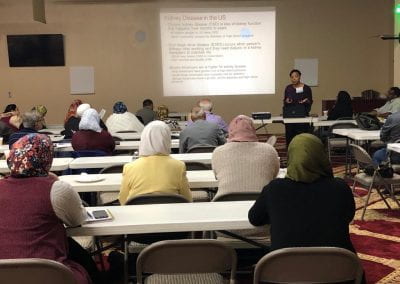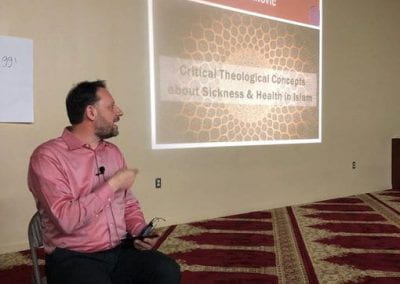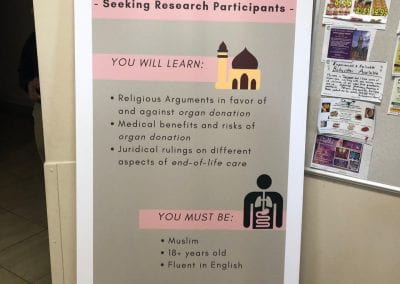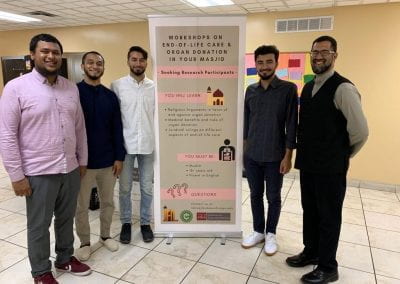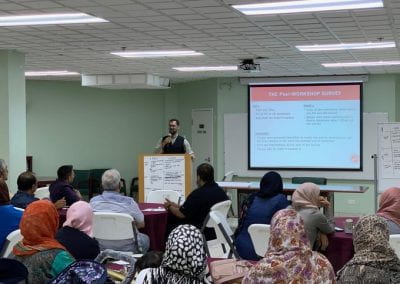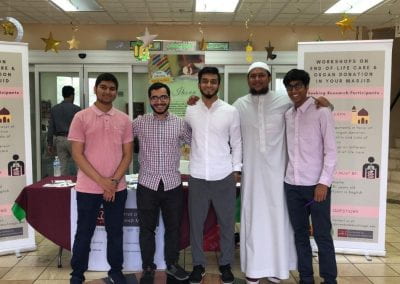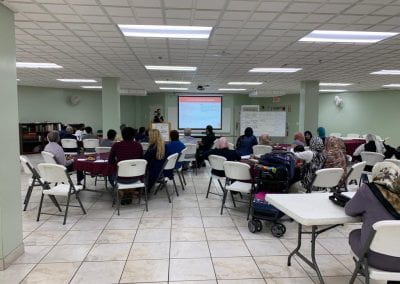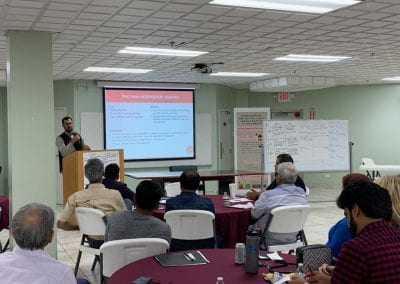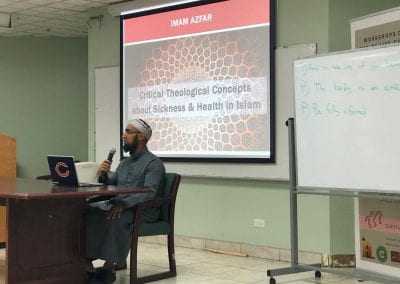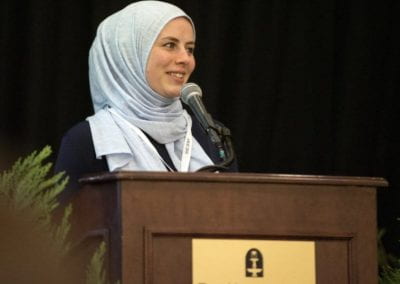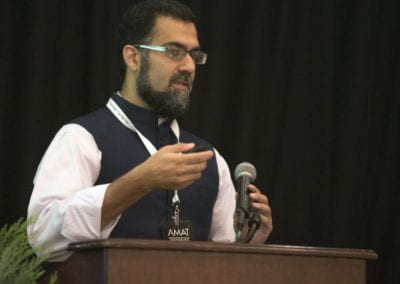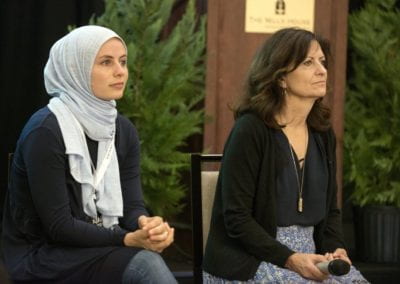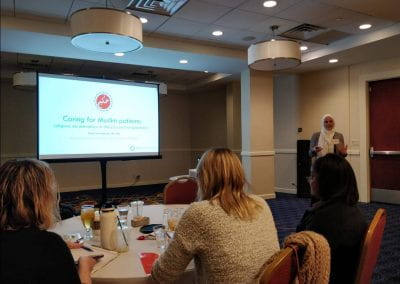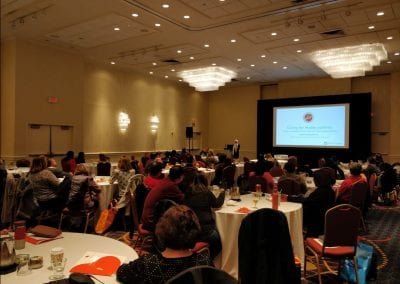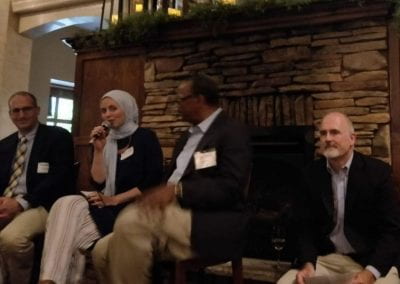Developing a Religiously-Tailored Health Education Model for American Muslims
Academic Papers
Op-Eds
- Perspectives on Organ Donation and Transplantation Practical steps to moving forward in light of the latest legal opinion
- Helping Those You Know: The possibilities of deceased directed donation
Academic Papers
- Study Protocol for ‘Informing American Muslims About organ Donation (I AM a LD)’: A Randomized Controlled Cross-Over Trial Evaluating the Effect of Religiously- Tailored Health Education
- The Ethics of Organ Donation After Circulatory Determination of Death and Xenotransplantation from an Islamic Perspective
- Factors Associated with Positive Attitudes Towards Organ Donation in Arab Americans
- Relationships between Islamic religiosity and attitude toward deceased organ donation among American Muslims: a pilot study
- American Muslim Physician Attitudes Toward Organ Donation
- A Mosque-Based Qualitative Study on American Muslim Women’s Organ Donation Beliefs
Academic Presentations
- Aguilar, Jennifer. Cochran, Susan.Craig, Megan. Duivenbode, Rosie. Padela, Aasim. Developing Religiously-Tailored Health Education to Inform American Muslims about Organ Donation.The Association for Multicultural Affairs in Transplantation Conference.September 19, 2019, Charleston, South Carolina.
- Duivenbode, Rosie. American Muslim Attitudes Towards Common Fertility Treatment Options: A Mosque-Based Cross Sectional Study. Advancing Muslim American Health Priorities Conference.October 19,2019. Chicago,Illinois
- Duivenbode, Rosie.Working with Muslim Patients. Interdiscplinary Nephrology Conference hosted by the National Kidney Foundation. October 29, 2019, Oak Brook, Illinois.
Replication Toolkit
Replication Guide
Community members who are interested in replicating religiously-tailored, peer led, organ donation workshops in your mosque can use our replication guide to help plan workshops that address both biomedical and religious knowledge regarding living organ donation.
PowerPoint Presentations
Click on the PowerPoint titles below to download for public use.
- Biomedical Aspects of Living Donation
- Organ Procurement Process
- Islamic Perspectives on Living Organ Donation
Educational Resources
Community members who are interested in replicating the workshops can find samples of our peer education training manual, participant course booklets, as well as other educational documents and videos that might be helpful in organizing the workshops.
DC Workshops
Dr. Aasim Padela presenting, “Islamic Perspectives on Living Organ Donation” at ADAMS- Sulley in DC.
DC Workshops
Dr. Milda Saunders presenting, ” The Biomedical Aspects of Living Organ Donation” in ADAMS-Sterling DC.
ADAMS Sterling DC
Dr. Ermin Sinanovic presenting, “Critical Theological Concepts about Sickness & Health in Islam in ADAMS-Sterling DC.
Peer Education Training
I&M trained 13 peer educators at Gift of Hope in Chicago. Peer educators facilitated the organ donation and end-of-Life care workshops.
IFN Recruitment Volunteers
Pictured left to right: Imadul Chowdhury, Fahad Abbasi, Zayd Ahmed, Orhan Onder, Dr. Aasim Padela recruiting mosque goers during Jumu’ah.
IFN Recruitment Volunteers
Pictured left to right: Muhammad Muqsith, Anas Qatanani, Fahad Abbasi, Imadul Chowdhury, and Ali Siddiqui recruiting mosque goers during Jum’uah.
Chicago Workshops
Dr. Aasim Padela pictured delivering the End-of-Life Care workshops at IFN Mosque in Libertyville, IL.
Chicago Workshops
Dr. Aasim Padela presenting, “Islamic Rulings about Brain Death & Withdrawing/Withholding Life Support.”
Chicago Workshop
IFN’s Imam Azfar presenting, “Critical Theological Concepts about Sickness & Health in Islam.”
AMAT 2019
Dr. Rosie Duivenbode speaking at the Association for Multicultural Affairs in Transplantation ‘s 2019 Conference in South Carolina.
AMAT 2019
Pictured left to right: Jennifer Aguilar (Community Outreach Specialist at Gift of Hope) and Dr. Aasim Padela (Principal Investigator of the study and Director of II&M).
AMAT 2019
Dr. Aasim Padela speaking at the Association for Multicultural Affairs in Transplantation ‘s 2019 Conference in South Carolina.
AMAT 2019
Pictured left to right: Dr. Rosie Duivenbode (Post Doctoral Research Fellow at II&M) and Susan Cochran (Aftercare Specialist/ Interfaith Outreach Coordinator at Gift of Hope).
Interdisciplinary Nephrology Conference
Dr. Rosie Duivenbode speaking at the National Kidney Foundation’s 2019 Interdisciplinary Nephrology Conference in Oak Brook, IL.
Interdisciplinary Nephrology Conference
Dr. Rosie Duivenbode delivering her talk, “Caring for Muslim Patients: Religious Considerations in Dialysis and Transplantation.”
Chicago Round Table on Science & Religion
Dr. Rosie Duivenbode speaking alongside Jewish and Christian Drs. Noam Stadlam and James Sherley for Chicago Round Table’s Conversations on Religion and Bioemedical Research.
Developing Religiously Tailored Intervention
Supported by:
Community Advisory Board
-
Tareq Abedin
-
Mohammad Yahya Alvi
-
Jaseem Anwer
-
Naeem Baig
-
Fawzia Fazily
-
Irfan Galaria
-
Mahsin Habib
-
Muhammad Nabeel Hasan
-
Kamran Husain
-
Mohammad Khalid
-
Fauzia Lodhib
-
Saulat Pervez
-
Rafiq Rakhangi
-
Latif A. Rasheed
-
Irfan Shaikh
-
Neima Surur
-
Sabih Uddin
-
Abdul Rahman Wajid





